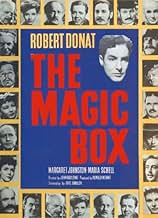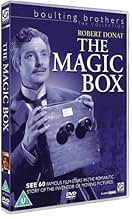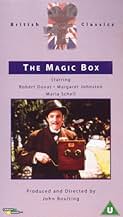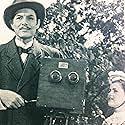PUNTUACIÓN EN IMDb
7,0/10
1,5 mil
TU PUNTUACIÓN
Añade un argumento en tu idiomaA chronicle of the life of William Friese-Greene, a British inventor and early pioneer in cinema.A chronicle of the life of William Friese-Greene, a British inventor and early pioneer in cinema.A chronicle of the life of William Friese-Greene, a British inventor and early pioneer in cinema.
- Dirección
- Guión
- Reparto principal
- Nominado a 2 premios BAFTA
- 1 premio y 2 nominaciones en total
Renée Asherson
- Miss Tagg
- (as Renee Asherson)
Reseñas destacadas
The most enjoyable and very emotional scene was when Robert Donat (Wm. Friese-Greene) finally succeeds in producing moving images on a sheet he's hung in his studio...he runs like a madman into the street in the middle of the night desperate to find someone to witness this miracle. Who does he find? Sir Laurence Olivier..a Police Constable . Donat ushers him into his lab, sits him down and proceeds to ramble on about what he's invented. Sir Laurence, the ever vigilant and cautious policeman thinks he's some kind of nut and slowly reaches for his night stick..that's when Robert Donat flicks on the first moving pictures of Hyde Park...Olivier is flabergasted..gets up moves to the sheet and looks behind it.."That's Hyde Park!' After rambling some more Robert Donat breaks into tears..finally explaining what he has accomplished..Olivier replies "You must be a very happy man"..a terrific scene and one I'll never forget. A cameo appearance by Lord Olivier and a very memorable scene.
I'm sure it didn't hurt in the resolve of the British film industry to honor one of its pioneers and one who some claim to have been the actual inventor of motion pictures, William Friese-Greene, to have one of his grandchildren, Richard Greene as a film star in his own right. The Magic Box is a fine tribute to someone generally forgotten if known at all to American audiences especially.
Robert Donat brings his Mr. Chips character and weaves it into the character of William Friese-Greene. The story is told in flashback and in reverse order, first by his second wife Margaret Johnston from their first meeting in 1897 through their marriages and then later by Donat himself as he remembers his first wife Maria Schell. But in both remembrances, the thing that stands out is his driving obsession to capture movement on some medium. As Donat eloquently puts it, 'movement is life'.
It costs him dear, he does not get the credit he feels due him, it goes to that upstart Thomas Edison from the USA. Actually fellow Britishers George Alfred Smith and Charles Urban and Frenchmen Auguste and Louis Lumiere and Emile Reynaud all could claim pioneering contributions to the motion picture as well. Friese-Greene was a fine portrait photographer, but spent all his money on his experiments, even selling the patent he took out on his early motion picture camera.
Donat, Johnston and Schell are supported by a massive cast of the best British players doing small parts in tribute and belated recognition to the guy who now is considered if not THE inventor of motion pictures, the founder of British cinema. From Laurence Olivier in the role of an astonished policeman who is the first to see Robert Donat's breakthrough, to Bernard Miles as Donat's stuffy cousin who's worried about having the bite put on him, to young John Howard Davies as the youngest of Friese-Greene's sons, you'll recognize lots of familiar faces.
Still the film belongs to Donat as the obsessed, but touching Friese- Greene who helped give the world a universal medium of entertainment. Donat never gave a bad performance on the screen and Friese-Greene ranks among his best.
Robert Donat brings his Mr. Chips character and weaves it into the character of William Friese-Greene. The story is told in flashback and in reverse order, first by his second wife Margaret Johnston from their first meeting in 1897 through their marriages and then later by Donat himself as he remembers his first wife Maria Schell. But in both remembrances, the thing that stands out is his driving obsession to capture movement on some medium. As Donat eloquently puts it, 'movement is life'.
It costs him dear, he does not get the credit he feels due him, it goes to that upstart Thomas Edison from the USA. Actually fellow Britishers George Alfred Smith and Charles Urban and Frenchmen Auguste and Louis Lumiere and Emile Reynaud all could claim pioneering contributions to the motion picture as well. Friese-Greene was a fine portrait photographer, but spent all his money on his experiments, even selling the patent he took out on his early motion picture camera.
Donat, Johnston and Schell are supported by a massive cast of the best British players doing small parts in tribute and belated recognition to the guy who now is considered if not THE inventor of motion pictures, the founder of British cinema. From Laurence Olivier in the role of an astonished policeman who is the first to see Robert Donat's breakthrough, to Bernard Miles as Donat's stuffy cousin who's worried about having the bite put on him, to young John Howard Davies as the youngest of Friese-Greene's sons, you'll recognize lots of familiar faces.
Still the film belongs to Donat as the obsessed, but touching Friese- Greene who helped give the world a universal medium of entertainment. Donat never gave a bad performance on the screen and Friese-Greene ranks among his best.
A brilliant biography of one of the virtually unknown inventors of modern motion pictures. The historical aspects are incredibly well researched and detailed (look at the film credits)-- down to the reproduction of a beautiful example of his first twin-lensed motion picture camera, which was stereoscopic (which proved not be be practical until the introduction of polarized projection at the 1939 World's Fair). This film was made as a showcase piece for the 1951 "Festival of Britain" at the current location of the Royal Festival Hall and the Museum of the Moving Image on the banks of the Thames in London, England. What remains of the original Friese-Greene camera may be seen at the Science Museum in London. For those interested in the history of the cinema, and its earliest experiments, this is a "must see" film. Historical footage is brilliantly incorporated into the story. Although the presentation is a little bit slow by today's standards, it remains a fascinating and unique film. For related topics see the book "The Missing Reel", by Christopher Rawlence, about the other unknown film pioneer, Louis Aime Augustin Le Prince.
The most notable aspect of this film is the enormous number of famous actors, some of whom I didn't notice but saw them on the cast list. Older viewers will enjoy looking out for them. The acting is therefore generally very good.
I have two main criticisms of the film. First, the story is shown out of sequence, and would have been just as good and less confusing if shown in the correct sequence. Secondly, it is not accurate, being a strange mixture of fact and fiction. For example, at one point he meets William Fox-Talbot, who died when Friese-Green was only 22! If a biographical book made such a claim it would be strongly criticised, but for some reason which I have never understood it is perfectly acceptable in the cinema.
So watch it purely for entertainment., but for biographical facts go to Wiki or elsewhere.
I have two main criticisms of the film. First, the story is shown out of sequence, and would have been just as good and less confusing if shown in the correct sequence. Secondly, it is not accurate, being a strange mixture of fact and fiction. For example, at one point he meets William Fox-Talbot, who died when Friese-Green was only 22! If a biographical book made such a claim it would be strongly criticised, but for some reason which I have never understood it is perfectly acceptable in the cinema.
So watch it purely for entertainment., but for biographical facts go to Wiki or elsewhere.
A first-class actor ,playing a character from his youth to an old man,with the same talent:he is as convincing as the mischievous boy who takes photographs unbeknown to his boss as the old man who tries to save the seventh art from the moneychangers in the Temple . The film has an unusually inventive construction:it is roughly made of two flashbacks ,but the first one takes place after the second one."The magic box" tells the story of a pioneer of the cinema who died in dire straits ("that's the price for a seat for pictures" )His destiny resembles that of Georges Méliès who ended his life selling candies in a railway station and who never complained about his fate.Geniuses often die unnoticed.The cinematography is splendid with tasteful colors ,the dialog does not forget humor (Donat:"Enjoy yourselves!Schell:"We're going to the church!!"),and there are very powerful scenes:the concert where Schell sings a moving solo "Where is he?I know not!I know not!";an ecstatic Donat showing his film to a constable .The cast is incredibly various and includes such luminaries as Laurence Olivier,Margaret Rutherford,Peter Ustinov,Stanley Holloway and more ,all in supporting parts or even often cameos.
How prophetic the pioneer's last words were!
How prophetic the pioneer's last words were!
¿Sabías que...?
- CuriosidadesOne of the extras in this movie is a teenage Ronald Kray (later the infamous London gangster).
- PifiasIn 1915 when Green's three eldest sons join the army, the landlord's agent mentions that the Spanish influenza is going around. In actuality the Spanish influenza did not begin until 1918.
- Citas
William Fox-Talbot: The original thinker - the innovator - mustn't mind seeming a little foolish to his contemporaries. He must always look to his star... In the end, he may still fail. That's unimportant. If he is true to himself, he won't be too unhappy or embittered, even in failure, and will still speak for what is good.
- Créditos adicionalesOpening credits superimposed over tablets bearing the following inscriptions: THOMAS ALVA EDISON 1847 - 1931 THE INVENTOR OF MOTION PICTURES / ETIENNE-JULES MAREY 1830 - 1908 FONDATEUR DU CINEMA / LOUIS LE PRINCE 1842 - 1890 L'INVENTEUR DE LA CINEMATOGRAPHIE LOUIS LUMIERE 1864 - 1948 AVEC SON FRERE LE CREATEUR DU CINEMA MODERNE
- ConexionesEdited into Kraft Television Theatre: The Magic Box (1956)
Selecciones populares
Inicia sesión para calificar y añadir a tu lista para recibir recomendaciones personalizadas
- How long is The Magic Box?Con tecnología de Alexa
Detalles
- Fecha de lanzamiento
- País de origen
- Idioma
- Títulos en diferentes países
- Der wunderbare Flimmerkasten
- Localizaciones del rodaje
- Empresa productora
- Ver más compañías en los créditos en IMDbPro
Taquilla
- Presupuesto
- 220.000 GBP (estimación)
- Duración
- 1h 58min(118 min)
- Relación de aspecto
- 1.37 : 1
Contribuir a esta página
Sugerir un cambio o añadir el contenido que falta


































